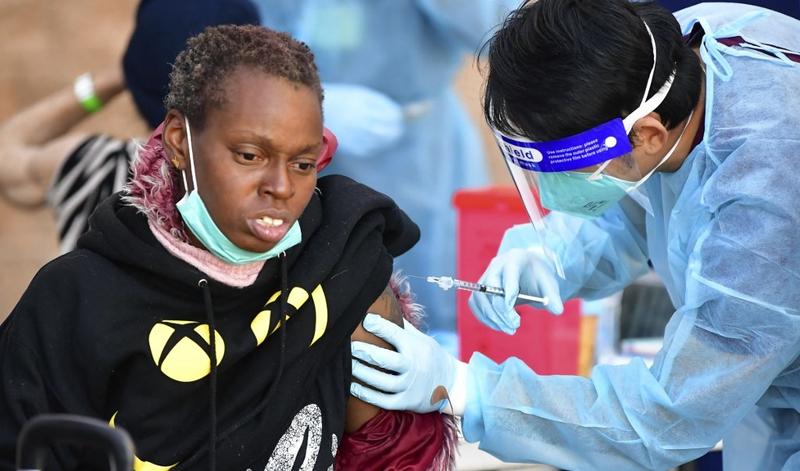 A registered nurse administers the Moderna COVID-19 vaccine to eligible people identified by homeless service agencies from the parking lot of the LA Mission on Feb 24, 2021 in Los Angeles, California. (Frederic J. BROWN / AFP)
A registered nurse administers the Moderna COVID-19 vaccine to eligible people identified by homeless service agencies from the parking lot of the LA Mission on Feb 24, 2021 in Los Angeles, California. (Frederic J. BROWN / AFP)
The US Food and Drug Administration, or FDA, is looking to quickly authorize COVID-19 vaccine booster shots, but there are concerns about the safety of such approvals and newly tweaked vaccines without massive trials.
Several drugmakers are already working to revise their vaccines to meet the rapidly evolving strains of the coronavirus
The FDA issued new guidelines on Monday that would enable trials for coronavirus booster shots aimed at emerging variants to be narrower than those for the original COVID-19 vaccines. The guidelines are intended to speed up the review process amid worries that the new variants will undermine efforts to halt the virus' spread.
While new guidance also says a tweaked COVID-19 vaccine can skip the monthslong process of a randomized clinical test that would compare it with a placebo, there are some concerns whether the modified vaccines will be safe enough without major trials.
ALSO READ: J&J single-shot vaccine found effective before FDA review
Some other vaccines are regularly updated similarly. Because the influenza virus evolves rapidly from one year to the next, vaccine developers have to come up with new recipes annually.
Moreover, the newly tweaked vaccines still will need to go undergo some testing. In documents released by the FDA on Monday, it said immunizations that protect against the variants could receive clearance based on immunogenicity studies, in which researchers vaccinate people and then conduct laboratory tests to measure the strength of their immune response.
Those tests, similar to what is done for annual flu shots, are far simpler than the standard efficacy studies used for clearance of the initial vaccines, which involved thousands of volunteers and took months of work, Bloomberg said.
The new guidelines allow companies to conduct trials with a few hundred people, which are likely to take two or three months, Peter Marks, the FDA's director for the Center for Biologics Evaluation and Research, told reporters on Monday.
In the future, "modified COVID-19 vaccines may be authorized without the need for clinical studies", the FDA noted. But that isn't yet the case.
New concerns
"We know the country is eager to return to a new normal, and the emergency of the virus variants raises new concerns about the performance of these products," Janet Woodcock, the acting FDA commissioner, said in a news release.
"We want the American public to know that we are using every tool in our toolbox to fight this pandemic, including pivoting as the virus adapts."
READ MORE: US seeks to return to UN human rights body
Several drugmakers are already working to revise their vaccines to meet the rapidly evolving strains of the coronavirus.
Moderna, the Oxford University and AstraZeneca partnership, and Novavax are preparing for clinical trials of vaccines tailored to the new variants or boosters. Others have said they could adapt their shots but haven't yet announced plans for new studies.


